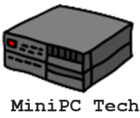
Hey there! I’m Michael. This cozy corner of the internet, Mini PC Tech, is where I channel my fascination with ultra-compact computing into insightful articles, reviews, and muses. If you’re intrigued by the tiny yet mighty powerhouses that have redefined our digital experience, then you’re in the right place.
My mission here is straightforward: to explore every facet of Mini PC technology. From the tin miniature hardware to the vast software landscapes they host, and even the environments where these unassuming devices thrive. Think of the Mini PC as a continuous odyssey through the ever-evolving realm of pint-sized computing wonders.
I’ve got the credentials to back up my tech talk – a bachelor’s degree in Biomedical Engineering from Rensselaer Polytechnic Institute and a pair of master’s degrees in Electrical Engineering and Biomedical Engineering from the prestigious Carnegie Mellon University. I then embarked on a 45-year career in such diverse roles as a Software Developer, Digital Signal Processing Engineer, Scrum Master, Cybersecurity Analyst, Product Marketing Engineer, and QA engineer. Along the way, I got a JD, and was licensed to practice law before the California Bar and US Patent and Trademark Office. I also hold 6 patents as well. My early days were spent programming everything from the venerable Commodore PET to the cutting-edge virtual machines on AWS. With two cybersecurity certifications under my belt, I’ve also safeguarded fintech innovation from looming digital threats.
Before these pixels form the full picture, know this: Mini PCs are my passion, my hobby, and my area of expertise. But most importantly, they’re a testament to the progression of technology that I’ve had the pleasure to witness and be part of. So, let me take you along on this remarkable journey, one byte-size revelation at a time.
My Journey with Technology
I owe my affinity for technology to a robust educational foundation. My adventure began at Carnegie Mellon University, where I earned masters degrees in both Electrical Engineering and Biomedical Engineering. It was there that my passion for innovation and problem-solving in tech took root.
Programming became second nature to me. As a young engineer at Lawrence Livermore National Laboratory, I cut my teeth on the Commodore PET. As a developer at a fintech company, I finished up working on virtual machines in AWS. I coded solutions that spanned from physical devices to cloud architectures. Over the years, my career evolved, and I became a guardian of digital safety with two cybersecurity certifications under my belt.
For three years, I immersed myself in the world of cybersecurity, analyzing threats and fortifying defenses. That chapter of my career taught me the complex dance of securing sensitive data and the importance of proactive vigilance in a digitalized world.
Retirement offered me the liberty to return to my roots and passion: the fascinating arena of mini PCs. These small but mighty machines captivated my interest with their simplicity and potential—an interest I am now channeling through Mini PC Tech.
The Evolution of Mini PCs – Then and Now
I sometimes reminisce about the early days of small computers when my passion for the subject first kindled. The TRS-80 and Commodore 64 weren’t merely devices; they represented possibilities and a future where technology was accessible and personal. That’s where I started, toggling those switches and tapping into a world of code and innovation.
HP’s handheld ‘palmtop’ computers marked another milestone, reflecting a shift toward portability and convenience. My days at Lawrence Livermore saw the practical uses of such devices in a scientific setting, running calibrations in the measurement labs. It highlighted just how versatile these compact machines could be outside a traditional office space.
Nevertheless, the game-changer for me was undoubtedly the Mac Mini. Its introduction was a revelation. A full-fledged computer with a small footprint that fit seamlessly into my life, becoming a powerhouse behind my 65″ smart TV. With a Mac Mini, the Internet wasn’t just at my fingertips; it was larger than life. It laid the groundwork for versatile computing that didn’t dominate the room.
The innovation didn’t stop there. The 2010s saw an explosion of mini PCs, from the utilitarian Raspberry Pi to the sophisticated NUC mini. These weren’t just gadgets; they were transformative, finding their way into digital signage, home entertainment, and even gaming contests.
Reflecting on the evolution, I appreciate how far we’ve come. Mini PCs aren’t just equipment; they’re a lifestyle, seamlessly integrating into our environments and enhancing our daily interactions. As we move toward future innovations, I remain passionate about where this journey will take us next.
Embracing the Mini PC Lifestyle
I’ve seen firsthand how miniature PCs can reshape our interaction with technology. When my wife’s uncle needed a new computer, the traditional bulky tower was no longer practical for his cozy den. That’s when I introduced him to the sleek, space-saving KAMSUI mini PC. Skeptical at first, he soon discovered its convenience and now, he can’t imagine his den without it.
These are the stories I live for. Mini PCs are not just about being small; they are a testament to how we’ve reimagined the personal computer to fit seamlessly into our lives. Whether hidden behind a digital sign, nestled quietly in a living room setup, or accompanying professionals on their travels to gaming contests, the possibilities continue to expand.
My dedication to Mini PC Tech is rooted in the potential I see for these devices. Their small size and inconspicuous nature open doors to countless applications, from entertainment systems to portable powerhouses. As the mini PC continues to evolve, so does the way we think about personal computing. I’ll be here every step of the way, exploring, testing, and sharing the very best of mini PC technology with you.
